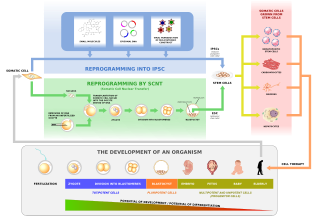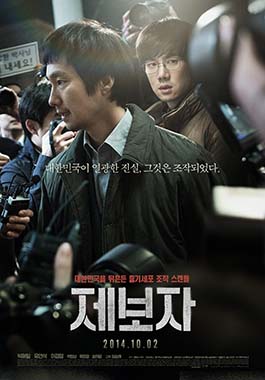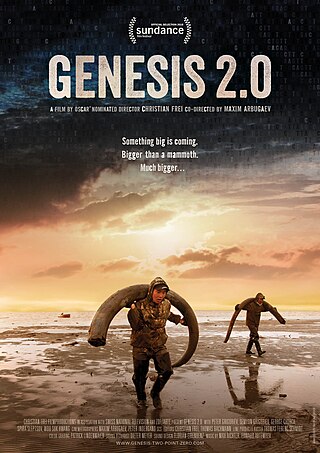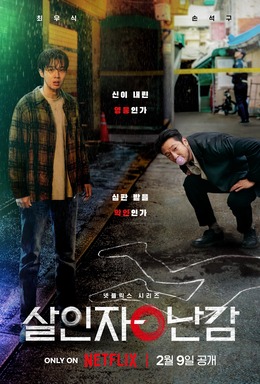
Human cloning is the creation of a genetically identical copy of a human. The term is generally used to refer to artificial human cloning, which is the reproduction of human cells and tissue. It does not refer to the natural conception and delivery of identical twins. The possibilities of human cloning have raised controversies. These ethical concerns have prompted several nations to pass laws regarding human cloning.

Clonaid is an American-based human cloning organization, registered as a company in the Bahamas. Founded in 1997, it has philosophical ties with the UFO religion Raëlism, which sees cloning as the first step in achieving immortality. On December 27, 2002, Clonaid's chief executive, Brigitte Boisselier, claimed that a baby clone, named Eve, was born. Media coverage of the claim sparked serious criticism and ethical debate that lasted more than a year. Florida attorney Bernard Siegel tried to appoint a special guardian for Eve and threatened to sue Clonaid, because he was afraid that the child might be treated like a lab rat. Siegel, who heard the company's actual name was not Clonaid, decided that the Clonaid project was a sham. Bioethicist Clara Alto condemned Clonaid for premature human experimentation and noted the high incidence of malformations and thousands of fetal deaths in animal cloning.
Hwang Woo-suk is a South Korean veterinarian and researcher. He was a professor of theriogenology and biotechnology at Seoul National University until he was dismissed on March 20, 2006. He was considered a pioneering expert in stem cell research and even called the "Pride of Korea". However, he became infamous around November 2005 for fabricating a series of stem cell experiments that were published in high-profile journals, the case known as the Hwang affair.
Snuppy was an Afghan hound, the first dog clone. The puppy was created using a cell from an ear from an adult Afghan hound and involved 123 surrogate mothers, of which only two produced pups. The Department of Theriogenology and Biotechnology at Seoul National University, which cloned Snuppy, was led by Woo Suk Hwang. Snuppy has since been used in the first known successful breeding between cloned canines after his sperm was used to artificially inseminate two cloned females, which resulted in the birth of 10 puppies in 2008. In 2017, 4 clones of Snuppy were made by Sooam, and were the first clones made of a cloned dog, to investigate potential health effects of cloning.

Hwang Jung-min is a South Korean actor. He established himself as a leading man in the romantic drama You Are My Sunshine (2005). One of the highest-grossing actors in South Korea, Hwang has starred in several box office hits such as The Unjust (2010), Dancing Queen (2012), New World (2013), Ode to My Father (2014), Veteran (2015), The Himalayas (2015), A Violent Prosecutor (2016), The Wailing (2016), The Spy Gone North (2018), Deliver Us from Evil (2020), 12.12: The Day (2023). His performance in the latter earned him Best Actor at the 60th Baeksang Arts Awards.

Bae Doo-na, anglicized as Doona Bae, is a South Korean actress and photographer. She became known outside Korea for her roles as a political activist in Park Chan-wook's Sympathy for Mr. Vengeance (2002), archer Park Nam-joo in Bong Joon-ho's The Host (2006), and as the doll in Hirokazu Kore-eda's Air Doll (2009). She has had English-speaking roles in the Wachowski films Cloud Atlas (2012) and Jupiter Ascending (2015), as well as their Netflix television series Sense8 (2015–2018). In Korean-speaking roles, she is well known as the leading female character in the crime thriller Stranger (2017–2020), the Netflix period zombie thriller, Kingdom (2019–2020), and the sci-fi limited series The Silent Sea (2021).
The Missyplicity Project was a project devoted to cloning Joan Hawthorne and John Sperling's dog, a border collie and husky mix. Missy died on July 6, 2002, at the age of 15.

Jo Jung-suk is a South Korean actor. He began his career in theater, starring in Spring Awakening, Hedwig and the Angry Inch, Grease and the stage adaptation of The Harmonium in My Memory, among many other musicals and plays.

Producer's Note or PD Note is an investigative journalism program on MBC in South Korea.
Ryu Tae-joon is a South Korean actor and singer.

Kim Woo-bin is a South Korean actor and model. He began his career as a runway model and made his acting debut in the television drama White Christmas. He subsequently gained attention in A Gentleman's Dignity (2012), and made his breakthrough with School 2013 (2012-2013) and The Heirs (2013). Kim later starred in box office hits Friend: The Great Legacy (2013), The Con Artists (2014) and Twenty (2015). In 2016, he took on his first leading role on television in Uncontrollably Fond.

Hwang Dong-hyuk is a South Korean film director, producer and screenwriter. He is best known for directing the 2011 crime drama film Silenced, and for creating the 2021 Netflix survival drama series Squid Game. Time named him one of the 100 most influential people in the world in 2022.

Whistle Blower is a 2014 South Korean film directed by Yim Soon-rye.

Yim Soon-rye is a South Korean film director and screenwriter. She is considered one of the few leading female auteurs of Korean New Wave cinema.

Genesis 2.0 is a documentary film made by Swiss director and producer Christian Frei and Russian filmmaker Maxim Abugaev. The feature-length film was released in January 2018 in the World Cinema Documentary section at the Sundance Film Festival. At the center of the film is the woolly mammoth, an extinct and iconic species that today is surrounded by wishes and visions. On the one hand, the film documents the hazardous daily lives of a group of men who gather valuable mammoth tusks in a remote archipelago, the New Siberian Islands. On the other, it illuminates the potential of genetic research and synthetic biology — the means by which researchers hope to bring the woolly mammoth back to life.

The Hymn of Death is a 2018 South Korean television miniseries based on true events, starring Lee Jong-suk and Shin Hye-sun. It aired on SBS from November 27 to December 4, 2018, and is available on Netflix worldwide.

Sweet Home (Korean: 스위트홈) is a 2020–2024 South Korean apocalyptic horror television series starring Song Kang, Lee Jin-wook, and Lee Si-young. It is based on the Naver webtoon of the same name by Kim Carnby and Hwang Young-chan, which recorded over 2.1 billion net views. The first season was released on Netflix on December 18, 2020. The second season was released on December 1, 2023. The third season was released on July 19, 2024.

Squid Game is a South Korean television series created by Hwang Dong-hyuk for Netflix. Its cast includes Lee Jung-jae, Park Hae-soo, Wi Ha-joon, HoYeon Jung, O Yeong-su, Heo Sung-tae, Anupam Tripathi and Kim Joo-ryoung.

A Killer Paradox (Korean: 살인자ㅇ난감) is a 2024 South Korean crime thriller dark comedy television series written by Kim Da-min, directed by Lee Chang-hee, and starring Choi Woo-shik, Son Suk-ku, and Lee Hee-joon. Based on the Naver webtoon of the same name by Kkomabi, it tells the story of a man who accidentally murders a serial killer, and a detective who pursues him relentlessly. It was released on Netflix on February 9, 2024, and received generally positive reviews.
The Hwang affair, or Hwang scandal, or Hwanggate, is a case of scientific misconduct and ethical issues surrounding a South Korean biologist, Hwang Woo-suk, who claimed to have created the first human embryonic stem cells by cloning in 2004. Hwang and his research team at the Seoul National University reported in the journal Science that they successfully developed a somatic cell nuclear transfer method with which they made the stem cells. In 2005, they published again in Science the successful cloning of 11 person-specific stem cells using 185 human eggs. The research was hailed as "a ground-breaking paper" in science. Hwang was elevated as "the pride of Korea", "national hero" [of Korea], and a "supreme scientist", to international praise and fame. Recognitions and honours immediately followed, including South Korea's Presidential Award in Science and Technology, and Time magazine listing him among the "People Who Mattered 2004" and the most influential people "The 2004 Time 100".















